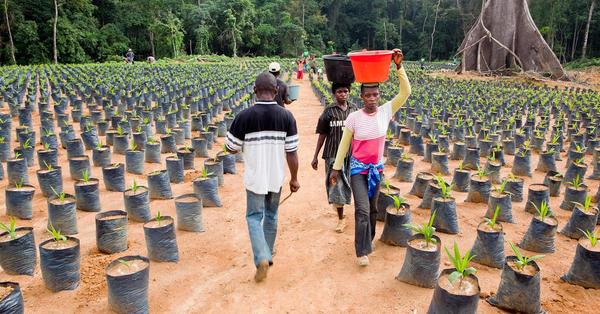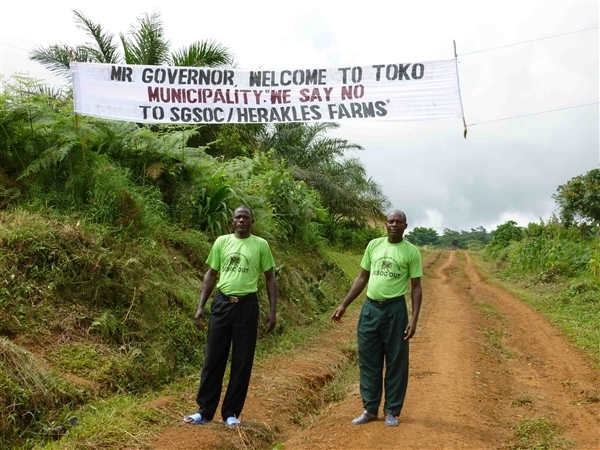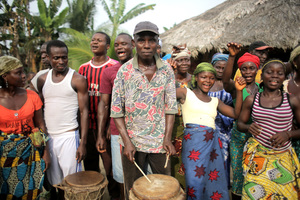Oil palm production in West and Central Africa | Annexes
The rush to develop oil palm plantations in Africa is a double whammy for the continent. Not only does it involve a huge land grab of peoples' lands and food producing resources, it also directly undercuts the livelihoods of millions of people involved in Africa's traditional oil palm sector.

The European powers also established their own oil palm plantations around this time. Plantations were created in West and Central Africa as well as in Southeast Asia. Research stations and collection missions were launched to develop high yielding varieties of oil palms through the cross breeding of traditional or wild varieties.
With independence, most of these plantations and research stations were nationalised, and the new African governments reenergised the expansion of national production. In Bénin, for example, the state-owned Société Nationale du Développement Rural (SONADER) led an expansion of oil palm plantations in the south immediately after independence, while another state-owned company, the Société Nationale pour l’Industrie des Corps Gras (SONICOG) built new palm oil refineries and palm nut processing factories.
But, at the end of the 1990s, World Bank and donor imposed structural adjustment programmes forced African governments to privatise their national palm oil companies and to sell off their mills and plantations. While many national companies simply crumbled away, European companies with old colonial connections captured the most lucrative operations. SOCFIN, controlled by billionaires Vincent Bolloré of France and Hubert Fabri of Belgium, took over national companies in Cameroon, the DRC, Guinea and Nigeria. SIAT, controlled by the family of South African diamond magnate Ernest Oppenheimer and the Belgian Vandebeeck family, took plantations in Gabon, Ghana and Nigeria, while another old money Belgian company, SIPEF took over a chunk of the state-owned oil palm plantations of Côte d'Ivoire. Unilever, one of the world's largest and oldest food companies, scored plantations too – in the DRC, Ghana and Côte d'Ivoire.
Today there is a second wave of foreign interest in oil palm plantations in Africa. With land for oil palm plantations becoming more difficult and expensive to acquire in Malaysia and Indonesia, companies and speculative investors are keen to open up new frontiers for export production. Some investment is going to Papua and to Latin America, but the biggest target is Africa. A long list of companies, from Asian palm oil giants to Wall Street financial houses, are scrambling to get control over lands on the continent that are favourable to oil palm, especially in the West and Central regions.
Over the past five years, vast areas of land in Africa have been allocated to foreign companies for oil palm plantations by African governments, with minimal if any consultation with the affected populations and many allegations of corruption. Table 1 lists 60 deals covering nearly 4 million hectares over the past decade and a half.
A number of different actors are involved. There are established Asian plantation companies, like Wilmar and Sime Darby, and multinational palm oil traders, like Cargill and Olam, both looking to establish a new basis of palm oil supply for global markets in Africa. But many of the first movers are in fact small obscure companies, typically domiciled in tax havens, whose owners intend only to sign land deals and then sell their companies as soon as possible to larger players with the capacity to develop the plantations. In many cases it is difficult to work out who the owners of these companies are.

Communities in southwest Cameroon have been involved in a three year struggle to stop the US company Herakles Capital from setting up an oil palm plantation in their area. Despite support from the president of Cameroon, Herakles has been unable to move forward with its plans because the communities are united in their total opposition to the plantation and because of the creative actions that they have undertaken, with support from national and international partners, to put pressure on the company to leave. The company and the government keep coming back and presenting new terms, the latest being a presidential decree that reduces the land allocated to Herakles from 73,000 ha to 20,000 ha and boosts the rent that the company must pay. Community leaders have been arrested and harassed with lawsuits. Yet the communities are sticking to their bottom line demand – no oil palm plantations on their lands.
Cameroon is also a target for the Luxembourg based company SOCFIN, owned by billionaires Vincent Bolloré of France and Hubert Fabri of Belgium. Over the past decade and a half, SOCFIN has taken over lands for oil palm and other crops in several African countries, including Cameroon, DRC, Guinea, Nigeria, Sao Tome & Principe, and Sierra Leone. The company is notorious for human rights abuses and land conflicts at its operations, and for its aggressive tactics against those who oppose it. In the past few years, the company has slapped defamation suits on several organisations and journalists in Africa and Europe that have spoken out against it.
On June 5, 2013, communities affected by SOCFIN plantations in four African countries held simultaneous protest actions against the company, as a delegation of diaspora from these countries and supported by the French group Réseaux d’Action Transnationale (ReAct) presented a joint letter from the various communities to the Annual General Meeting of the Bolloré Group, which is a major shareholder in SOCFIN.
“This initial international protest is just the beginning. We are committed to upholding our rights and Mr. Bolloré will have to understand that,” said Emmanuel Elong, spokesperson for Synaparcam, the Socapalm resident farmers’ union in Cameroon.2

The many different efforts to resist land grabs and maintain local control over palm oil production in Africa, Asia and Latin America demonstrate how committed local communities are to maintaining control over their ancestral lands and their biodiversity, for themselves and for future generations.
Oil palm production in West and Central Africa | Annexes
Notes
1 World Rainforest Movement, “Oil palm in Africa: past, present and future scenarios,“ 2010
2 Synaparcam, SoGB residents committee, Concern Union Citizen, and MALOA, "West African farmers stand up against Bolloré," 5 June 2013
3 For more information about the case see: http://sdiliberia.org/node/263